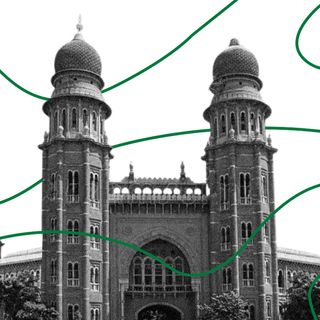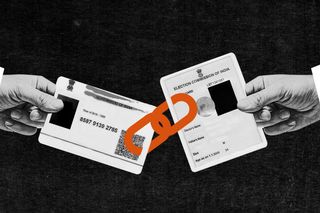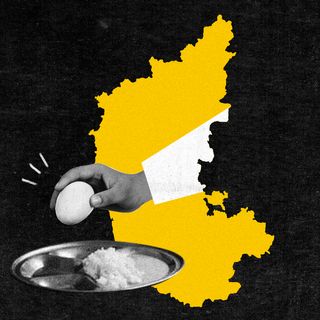
New Voting Reforms May Allow Linking of Aadhaar With Voter ID, Raising Privacy Concerns
A previous experiment with linking Aadhaar card led to deletion of 55 lakh voters across Telangana and Andhra Pradesh.

On Wednesday, the Union Cabinet cleared an electoral reforms Bill that would allow Voter IDs to be linked with Aadhar cards. The decision will be optional, but people who do make the link can vote using their Aadhaar details. The murky side? It may make it just a tad easier to profile voters based on their political ideologies, along with raisingconcerns about voter deletions.
The effort started earlier when the Election Commission (EC) first proposed a link between the two documents to curb voter duplications. Later, then law minister Ravi Shankar Prasad told Lok Sabha that the electoral link with the “Aadhaar ecosystem” will counter the “menace” of multiple enrolments. Now, this proposed link is part of four major amendments to the electoral laws that will be discussed in the winter session of the Parliament. Others include allowing first-time voters turning 18 to have the chance to register four times a year; making the law gender-neutral for service officers (allowing the husband of the service officer to vote as well); and giving the EC more power.
The whole exercise is currently being framed as a way to “strengthen” the electoral process by reducing voter fraud; even make it inclusive by giving migrant workers the right to vote irrespective of their location. Several champions of the Aadhaar-Voter ID link note that “illegal migrants” who may get the opportunity to vote due to the current loopholes are a “menace” to society.
But the association of the electoral roll with Aadhaar has raised concerns among experts — privacy invasion and profiling chief among them. In 2017, the Supreme Court recognized privacy as a fundamental right under the Constitution. But “the proposed linking in the absence of a Personal Data Protection (PDP) Law, can result in abuse and undermine the integrity of the voter roll,” Vibhav Mariwalaand Prakhar Misra noted in The Indian Express. The process of procuring an Aadhaar card may require demographic information, such as caste certificate or driving license — data which could then be appropriated.
“This information could be used for targeted political advertising and, possibly, disenfranchisement,” the researchers added. In other words, it would be easy to manipulate people’s political preferences and target them on this basis, using Aadhaar data.
Of course, any such linkage would require a strict infrastructure. The government currently maintains that the Aadhaar number will only be used for purpose of voter authentication. But the fear of misappropriation is not irrational. Using Aadhaar data to surveil people has happened before; the Telangana governmentwas able to collect citizens’ data, including personal details like caste and religion, to identify the homes of 5,166,698 families in 13 districts in Andhra Pradesh. The incident showcased “the ability of using Aadhaar to create giant, detailed, searchable citizen databases and confirms their worst fears about how India’s big-data governance revolution can be subverted to target vulnerable citizens,” experts said.
There is also a concern about voter deletions. In 2015, the EC started the National Electoral Roll Purification and Authentication Programme (NERPAP) “with the prime objective of bringing a totally error-free and authenticated electoral roll.” As evident, one of the objectives was to link Aadhaar data with the Electoral Photo Identity Card data. When this Aadhaar-electoral link was experimented, almost 55 lakh people’s names were left out of the electoral process.
Reportedly, the Andhra Pradesh and Telangana Aadhaar data was also leaked to the Telugu Desam Party during the 2019 elections. Justice B. N. Srikrishna, the chairman of the committee that drafted the Personal Data Protection Bill, in 2019 called the proposal “most dangerous,” arguing that “if [the government] can collate the data, [it] can profile human beings.”
Related on The Swaddle:
In September this year, more than 500 citizens and organizations wrote to the Election Commission discouraging them from pursuing this linkage. “Any attempts to link Aadhaar to the voter IDs would lead to demographic information which has been linked to Aadhaar, being linked to the voter database. This creates the possibilities for disenfranchisement based on identity, increased surveillance, and targeted advertisements, and commercial exploitation of private sensitive data. In 2019, the Cambridge Analytica scandal demonstrated the disastrous impact that deep and invasive voter-profiling had on individuals and on democracies,” the letter said.
For now, the link between the Aadhaar card and voter ID will be done on a voluntary basis. But history carries a lesson with the whole “voluntary-mandator” rhetoric. Throughout Aadhaar’s implementation, the requirement for Aadhaar varied when it came to PAN card, bank accounts, other resources. That the current linkage is “voluntary” may thus serve as a red herring.
Moreover, there is little evidence to suggest that the proposed linkage will reduce voter fraud; if anything, it may increase the pain points. There are multiple cases where fraudulent Aadhaar cards were used to acquire passports; in 2020, UIDAI reported that it canceled 40,000 fake Aadhaar cards. Even dogs were issued Aadhaar cards in Uttar Pradesh.
“The reported scope for fraud with Aadhaar, this process could undermine the sanctity of the voter roll,” Mariwala and Misra argued. Moreover, the infrastructure is not robust. Just recently a researcher found glaring loopholes on the voters’ portal, which could have opened the floodgates of data leak of lakhs of voters. Recently, the Unique Identification Authority of India (UIDAI), the makers of Aadhaar, requested an exemption from the ambit of the PDP as well.
In 2018, the Supreme Court had limited the scope of Aadhaar authentication solely for welfare programs, while delivering its judgment on the constitutionality of Aadhaar. “The Aadhaar project has failed to account for and remedy the flaws in its framework and design which lead to serious issues of exclusion… Constitutional guarantees cannot be subject to the vicissitudes of technology,” the bench noted then, with others calling this a “judgment for the ages.” Prasanna S., a lawyer who has been involved with the Aadhaar litigation, also said: “Voting is a constitutional right, not a welfare benefit.”
In the end, the proposed amendment is packaged as a “single form of documentation” meant to simplify the process. But studies have shown the mechanism may further disenfranchise citizens by removing them from the electoral system (a Latin America specific study noted people weren’t able to prove their identities due to the inextricable links). “Considering many people have had trouble in establishing their identity for collecting food rations or mid-day meals using Aadhaar, it could be an issue for voting as well, thus undermining the institution of democracy itself,” Mariwala and Misra added.
When Aadhaar was used to screen the Mahatma Gandhi National Rural Employment Guarantee Act (MGNREGA) and the Public Distribution System (PDS) databases, it led to arbitrary deletions of people from databases — further restricting people’s access to welfare schemes.
For now, the draft Bill now carrying the cabinet’s approval, will sit through parliament. “No consultations with any political parties, the Election Commission of India recommended a law to link Aadhaar with Voter ID & now cabinet has approved it. At this rate, the bill will be bulldozed through the parliament,” Srinivas Kodali, a data scientist and researcher, wrote.
Welcome to another chapter of 1984.
Saumya Kalia is an Associate Editor at The Swaddle. Her journalism and writing explore issues of social justice, digital sub-cultures, media ecosystem, literature, and memory as they cut across socio-cultural periods. You can reach her at @Saumya_Kalia.
Related


In India’s Juvenile System, Children Are Criminalized for Their Circumstances
